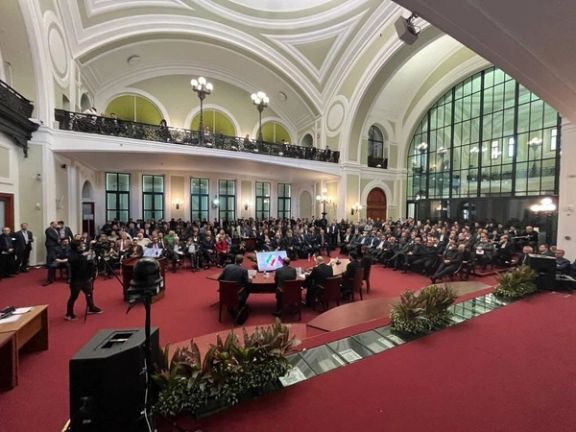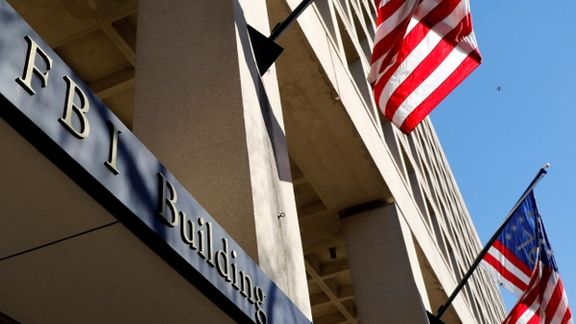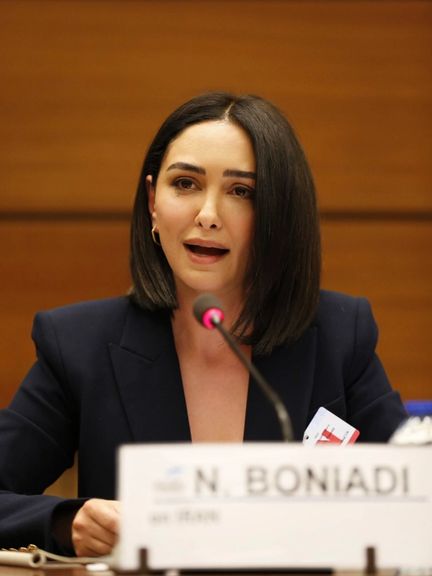Iran Media Say $7 Billion To Be Released For Freeing Three Hostages

Media in Tehran say $7 billion of Iran's frozen funds in South Korea will be freed in exchange for the release of three American dual citizens held as hostages.

Media in Tehran say $7 billion of Iran's frozen funds in South Korea will be freed in exchange for the release of three American dual citizens held as hostages.
The article quoted an unnamed informed source as saying that Iran is set to release three dual Iranian-American prisoners -- Siamak Namazi, Bagher Namazi, and Morad Tahbaz -- in exchange for access to its blocked funds in two South Korean banks.
Tahbaz -- also a UK citizen – is an environmentalist who was jailed in 2018 on trumped-up espionage charges. Siamak Namazi, was jailed 2015, a year before his elderly father Bagher (Baquer) traveled to Iran to help him but was also detained on vague accusations, like his son who was accused of collaboration with a foreign country. The Namazi detentions took place while the nuclear deal with Iran was in effect. In 2016, Tehran released other hostages in exchange for funds frozen in the US.
According to the article, the assets will be released into Iranian accounts through channels similar to the framework agreed with Britain, in which, €470 million was paid by the UK in exchange for the release of two British Iranians -- Nazanon Zaghari-Ratcliffe and Anoosheh Ashuri in March.

The US-led coalition in Syria says two of its troops were lightly injured when artillery rounds hit a base housing American troops in the country’s north-east.
The International Coalition for Operation Inherent Resolve said the two wounded coalition members were treated and returned to duty following the early Thursday attack at Green Village in Deir al-Zor province bordering Iraq.
Iraqi sources, speaking on the condition of anonymity, said those wounded were Americans, and that one of them suffered traumatic brain injury.
Green Village, located just east of the Euphrates River, is used by some of the several hundred US forces in Syria.
Iran-backed militias in Syria and Iraq have often targeted US bases in the two countries, vowing to drive out the Americans from the region.
A war monitor, the Britain-based Syrian Observatory for Human Rights, said five rockets were fired early Thursday from positions west of the river where Iran-backed fighters are concentrated.
On Wednesday night, three Katyusha rockets landed near an oil refinery in Iraq's northern semi-autonomous Kurdish region but no casualties or material damage were reported.
The Kawergosk refinery, about 20 kilometres north-west of the regional capital, Erbil, is one of the largest in the oil-rich area.
Nobody has immediately claimed responsibility for the attacks, which followed a series of assaults on US forces and their local partners in Iraq and Syria carried out by Iran and its allied paramilitary groups.

Iran and Russia held a trade conference Thursday in Moscow with representatives of over 370 businesses present.
Kazem Jalali, Iran’s ambassador in Moscow, Alireza Peyman-Pak, head of Iran’s Trade Promotion Organization, and Sergeĭ Katyrin, President of Russia’s Chamber of Commerce and Industry, all spoke on potential for boosting economic relations. The Iran-Russia Trade Convention was held in the conference hall of the Russian Chamber of Commerce and Industry in Moscow.
Jalali told Iranian state broadcasting that that over 300 Russian businesspeople were present, with others from across Russia following the conference online. Peyman-Pak said Iran was willing to increase trade to $10 billion in the short term. Trade reached $3.3 to 4 billion in 2021, with Russian exports outweighing Iran’s by around three to one.
Trade between Russia and Iran was rising even before the United States imposed ‘maximum pressure’ sanctions on Iran in 2018, slashing Iran’s business links with western Europe, and may increase further with US and western European sanctions against Russia over the Ukraine crisis.
Representatives of 70 Iranian and 300 Russian companies in nine sectors, including industry, technology, petrochemicals, medicine, and food, held meetings at Thursday’s conference. Over 50 of the Iranian participants were from the private sector, including companies dealing with cement, aquaculture, clothing, medical equipment, and pharmaceuticals. The Iranian delegation, which arrived in Moscow Monday, is reportedly the biggest ever to visit Russia.

Two men, one with an Iranian name were arrested in Washington on Wednesday for posing as federal agents and giving expensive gifts to Secret Service personnel.
There was no reference in the media to the nationality status of the suspects, whether they were American citizens or legal residents, nor any reference to their possible overseas connections.
One of the men was identified as Arian Taherzadeh, an Iranian-sounding name, while the second individual named Haidar Ali could be of a different Middle Eastern or Southwest Asian origin.
Federal Bureau of Investigation (FBI) agents stormed an apartment building where Taherzadeh was said to have several apartments, offering free of rent to Secret Service agents he had befriended, posing as a Homeland Security undercover investigator.
At least one Secret Service agent assigned to First Lady Jill Biden’s detail was a target of the suspects, who gave or offered expensive gifts to federal agents for yet unexplained reasons.
The conspiracy began in February 2020, according to the Washington Post. This coincides with the killing of Iranian Revolutionary Guard general Qasem Soleimani in a US airstrike in Baghdad in January 2020, for which Iran has vowed retaliation against former American officials such as Secretary of State Mike Pompeo. Whether the suspects have any connection with Iran could be speculative at this point before US authorities release more information on the case.
On January 6, 2021 the commander of Iran's Qods (Quds) Force Esmail Ghaani was quoted by Iranian media as saying that "revenge [for Soleimani] has started from day one and you will not have peace even in your own homes...and it cannot be ruled out that we take revenge in your own home."
FBI documents submitted to the US District Court show anti-terrorism agents are involved in the case, requesting search warrants for the suspects’ social media accounts and signing the criminal complaint.
Dozens of federal agents were seen in and around the apartment building on Wednesday, some carrying seized evidence presumably from the apartments belonging to Taherzadeh.
The suspects were fully set up to impersonate federal agents with an official-looking SUV and Tehrazadeh offered his targets gifts, such as weapons and generators, use of vehicles and apartments.
The complaint filed with the court said that four Secret Service personnel were placed on administrative leave on April 4. Both suspects are scheduled to appear in US District Court on Thursday and remain in custody.
The investigation began March 14, according to media reports, when accidently the men were brought to the attention of a US Postal Service inspector visiting the building in question. Residents identified the suspects as federal agents to the inspector, which led to the discovery that they were impersonators.

Twitter has moved to limit the accounts of governments that restrict open access to information for their citizens.
Twitter said it is applying new rules -- which came into force on Tuesday -- to any country that limits access to online services while engaging in interstate warfare. The popular social media platform initially only limited more than 300 official Russian government accounts, including those of President Vladimir Putin, official ministry and embassy profiles, as well as the accounts of high-ranking Russian official accounts.
Head of Site Integrity at Twitter Yoel Roth said, “When a government that's engaged in armed conflict is blocking or limiting access to online services within their country, while they themselves continue to use those same services to advance their positions and viewpoints - that creates a harmful information imbalance”.
Twitter is not banned in Russia but has been severely slowed down to the point of inoperability. The platform is completely banned in Iran while there are many Iranian officials and organizations that use it frequently.
So far, there has been no new move by Twitter to restrict access to Islamic Republic officials. Iranian users have been tweeting if the new policies would impact Supreme Leader Ali Khamenei who has multiple accounts on Twitter.
In the aftermath of Iran’s controversial 2009 presidential election, the government blocked Twitter fearing protests being organized.
In January, Twitter blocked an account linked to Supreme Leader Ali Khamenei after it published an animated video depicting the assassination of former US president Donald Trump.
In February, Twitter and Facebook suspended pages and profiles of an Iranian disinformation unit that was targeting nationalist and ultra-religious Jews in Israel.
Iran has restricted access to the internet for two decades, including popular social media platforms such as Facebook and You Tube for the past ten years. An overwhelming majority of Iranians routinely use circumvention software to go around government blockages.
After hardliners captured both the parliament and the presidency, they have proposed new legislation to further restrict access to the Internet and particularly to foreign-based social media platforms.
Currently only Instagram is accessible in Iran and it has become a major platform for commerce, keeping tens of thousands of small businesses afloat amid a serious economic crisis.

British-Iranian actress and human rights activist Nazanin Boniadi has asked the United Nations why Iran is a member of its Commission on the Status of Women.
"If we agree it is a farce for Russia to sit on the Human Rights Council, how can the Islamic Republic of Iran − a regime that subjugates women − be elected to the UN body for gender equality and empowerment of women?" she said Tuesday at the 14th Geneva Summit for Human Rights and Democracy. Members of the Commission on the Status of Women are elected from all continents for four-year terms. Current members include Afghanistan, Israel, Saudi Arabia, and the United States.
Boniadi, who left Iran in 1980 as a baby when her parents became political refugees, cited Narges Mohammadi, who last year refused to answer a court summons, and Zahra Kazemi, a dual Iranian-Canadian photojournalist who died in Tehran’s Evin prison in 2003. Boniadi said that support for UN resolutions over such cases was “the least people of Iran expect from the free world,” and welcomed the UN Human Rights Council extending the mandate of the Special Rapporteur on Human Rights in Iran.
“The people of Iran are being denied their basic human rights,” Boniadi said. “Since the 1979 revolution, the denial of fair trials and due process have been symptoms of the Iranian authorities’ disdain for the rule of law and those defending it, as well as tools for the monopolization of power and the persecution of those who challenge it.”